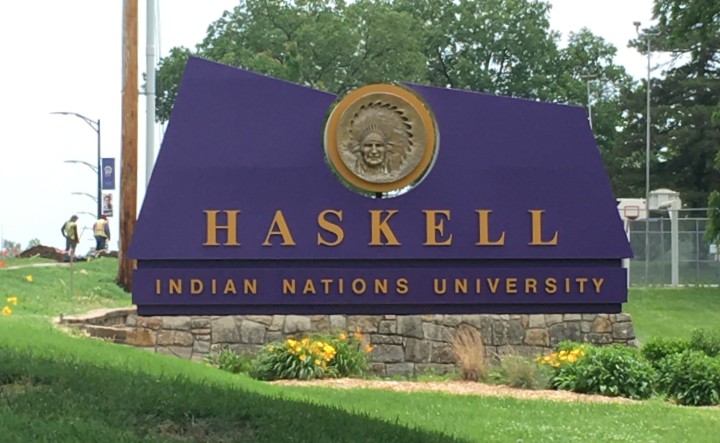
- Details
- By Neely Bardwell
Haskell Indian Nations University has received the largest research award ever granted by the National Science Foundation to a Tribal college or university.
Assistant Secretary for Indian Affairs Bryan Newland announced the $20 million award that will be used for an Indigenous science hub project. The Tribal University, located in Lawrence, Kansas, will receive the award for five years.
The project will create The Large Scale CoPe: Rising Voices, Changing Coasts: The National Indigenous and Earth Sciences Convergence Hub, a space for the convergence of disciplines and epistemologies where Indigenous knowledge-holders from diverse coastal regions will work with university-trained social, ecosystem and physical Earth system scientists and students on transformative research to address coastal hazards in the contexts of their communities.
“The Rising Voices, Changing Coasts hub to be located at Haskell Indian Nations University is a tremendous step forward in supporting Tribal communities as they address challenges from a rapidly changing climate,” said Newland in a statement. “This is an exciting and much-needed opportunity for scientists and Indigenous knowledge keepers to collaborate on how Indigenous people in coastal areas can build resiliency to the dynamic forces resulting from climate change.”
The hub is planned to focus their research in four regions: Alaska (Arctic), Louisiana (Gulf of Mexico), Hawai‘i (Pacific Islands), and Puerto Rico (Caribbean Islands) and the research is meant to enhance understanding of the interconnected physical, cultural, social, and economic processes that result in coastal hazards, as well as climate resilience opportunities.
They plan to collect data from Indigenous knowledge, modeling capabilities, archeological records, geographic information system techniques, socio-economic analysis and hazards research.
The Haskell Foundation Director Aaron Hove expressed his gratitude in a statement:
"This award is wonderful and critically important today. It cements Haskell's leadership role in Indigenous Climate Change research and demonstrates what a small institution can accomplish when it builds relationships with internationally known research institutions like the National Center for Atmospheric Research, Scripps Research Institute and large research universities."
More Stories Like This
Native Americans Could Be Hit Hard as Education Department Resumes Student Loan Wage GarnishmentHanging a Red Dress for Christmas: MMIP, Native Higher Education, and Hope for a Better New Year
Native Students Can Win $5,000 Scholarship, International Distribution in Pendleton Design Contest
American Indian College Fund Raises Alarm Over Plan to Shift Native Programs Away From the Dept. of Education
MacKenzie Scott Foundation Gives $5 Million Contribution to Little Priest Tribal College
Help us defend tribal sovereignty.
At Native News Online, our mission is rooted in telling the stories that strengthen sovereignty and uplift Indigenous voices — not just at year’s end, but every single day.
Because of your generosity last year, we were able to keep our reporters on the ground in tribal communities, at national gatherings and in the halls of Congress — covering the issues that matter most to Indian Country: sovereignty, culture, education, health and economic opportunity.
That support sustained us through a tough year in 2025. Now, as we look to the year ahead, we need your help right now to ensure warrior journalism remains strong — reporting that defends tribal sovereignty, amplifies Native truth, and holds power accountable.
 The stakes couldn't be higher. Your support keeps Native voices heard, Native stories told and Native sovereignty defended.
The stakes couldn't be higher. Your support keeps Native voices heard, Native stories told and Native sovereignty defended.
Stand with Warrior Journalism today.
Levi Rickert (Potawatomi), Editor & Publisher

